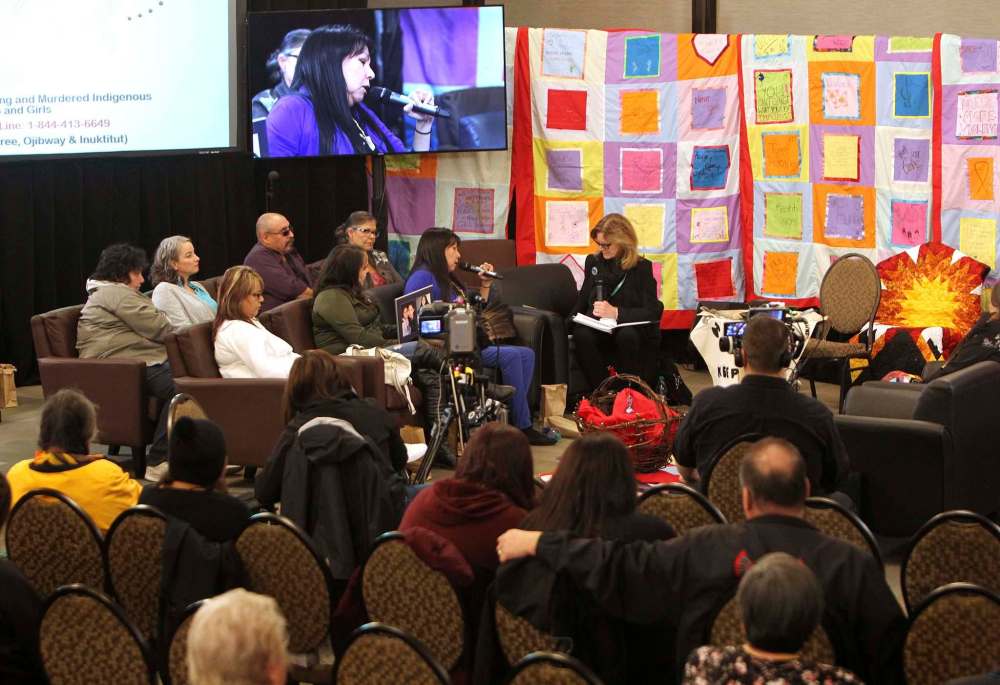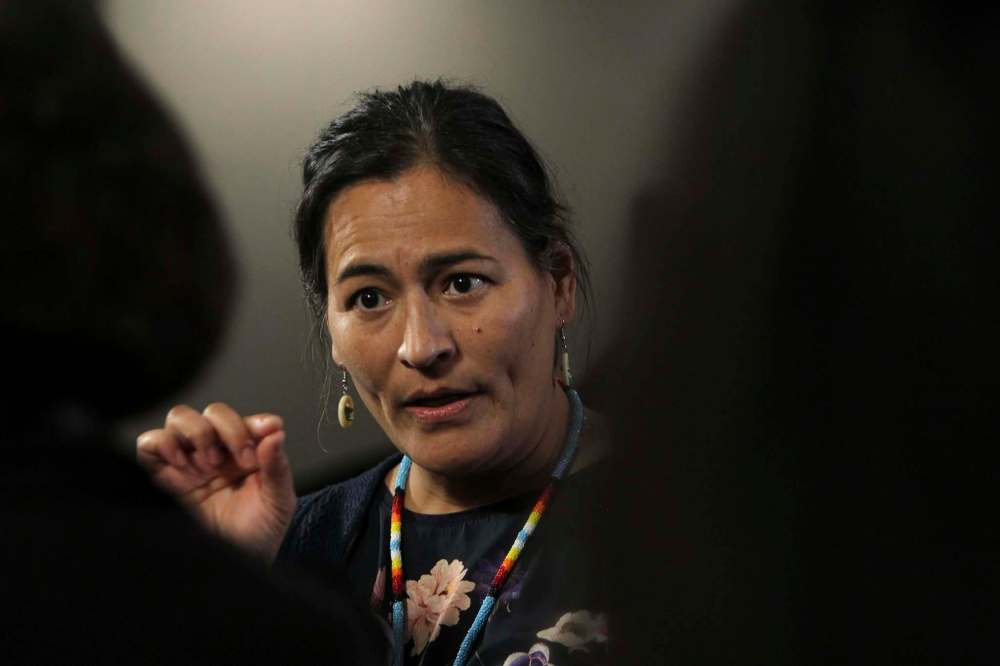Families push back at inquiry
More than 75 relatives want chance to tell their stories at MMIWG hearings
Advertisement
Read this article for free:
or
Already have an account? Log in here »
To continue reading, please subscribe:
Monthly Digital Subscription
$19 $0 for the first 4 weeks*
- Enjoy unlimited reading on winnipegfreepress.com
- Read the E-Edition, our digital replica newspaper
- Access News Break, our award-winning app
- Play interactive puzzles
*No charge for 4 weeks then billed as $19 every four weeks (new subscribers and qualified returning subscribers only). Cancel anytime.
Read unlimited articles for free today:
or
Already have an account? Log in here »
Hey there, time traveller!
This article was published 17/10/2017 (2381 days ago), so information in it may no longer be current.
A Manitoba activist who survived human trafficking and buried a cousin killed in a carjacking flatly dismissed the National Inquiry into Missing and Murdered Indigenous Women and Girls as a failure on Tuesday.
The second day of weeklong hearings in Winnipeg began with the blistering indictment and wrapped up with a mother interrupting questioning to insist, “I just want to tell my daughter’s story.”
In between, the inquiry heard from two community advocates who picked up the same theme: Indigenous people are left to eke out lives of despair on the margins of society. However, they are demanding space to be heard, not just at the inquiry, but at all levels of public life in Canada.
“The international community is watching. Canada is watching. And when the world is watching, it’s not the time to cut corners,” Leah Gazan said at hearings that continue through Friday at the downtown Radisson hotel.
In calling for the commission to better support families and listen more closely to their calls for change, the Winnipeg-based advocate warned people will show up to testify whether the inquiry is ready for them or not.
“Go to the communities. Ask, what do you need? Don’t wait for them to come to you. We forget how to nurture in bureaucracies but (if you do), you’ll have a lot more faith in this inquiry,” she said.
Gazan spearheaded a national social media campaign called #WeCare in the lead-up to Ottawa’s announcement of the inquiry a year ago. It drew hundreds of Canadians who posted selfies in of support Indigenous women and the inquiry.
Tuesday’s meetings began with Alaya McIvor, who tours Canada as an advocate for Indigenous women and girls, two-spirited and transgender people. A survivor of human trafficking, her family calls her “aunticle” to honour her status as a two-spirited human being.
“This is supposed to be our inquiry. Not your inquiry. No family should be left behind,” McIvor testified. “You should not be denying any family here or in any other Canadian city or give them an ultimatum saying, ‘We might come back.’ I don’t believe in this. I’m sitting here because of my auntie. She believed in this inquiry.”
McIvor talked about helping organize a walk to raise awareness about violence against First Nations women after her cousin, Roberta McIvor, was killed.
“We walked to Toronto and then to Parliament Hill (in Ottawa) with six caskets, with thousands of missing and murdered Indigenous women’s names on them,” McIvor said. “This is not what I walked across Canada for.”
In Winnipeg, more than 75 relatives of missing and murdered women are expected to testify — and more are coming forward each day. There are two rooms set aside for public hearings, as well as hearings in private sessions.

One of the four commissioners sat throughout the public hearings on Tuesday. Michèle Audette is a former president of the Native Women’s Association of Canada, which led sustained calls for a national inquiry. She expressed sympathy for the families.
“What I want to say is I’m sitting here, honoured to watch and receive your collective truth and I’m very sincere (about that),” Audette said. She told the McIvors they were “blessed” to have a strong advocate to speak up for their family.
“Many families don’t have that. They are voiceless.”
McIvor was scheduled twice Tuesday, first to testify about her early life being exploited by human trafficking and then about her slain cousin.
Roberta McIvor, 32, was found decapitated on the side of a road in 2011 on Sandy Bay First Nation in Manitoba. Within a year, two teenage girls in the Ojibway community were jailed in the horrendous carjacking and both pleaded guilty to manslaughter in McIvor’s death.
The crime pitted neighbour against neighbour and left a devastating impact on the entire family.
“I forced myself to finish school and I got out of there as fast as I could. It just doesn’t feel like home anymore,” McIvor’s daughter, Justine Strong, told the hearings.
Later, Barb Houle testified about the death of her daughter, Cherisse Houle, 17, a ward of child and family services who was found dead in Sturgeon Creek on the city’s outskirts in 2009.
Houle also redirected a commission lawyer leading her testimony by quietly interrupting and insisting, “I just want to tell my daughter’s story.”
Houle then described how child welfare workers intervened in a custody dispute with her ex-husband and how their family and Cherisse’s life spiralled out of control from there, until her daughter died. Her son was killed a year later.
For the Houle family, the portrayal of Cherisse in the media after her death as a “drug addict and a prostitute” was the final straw in a lifetime of being dehumanized.
“This is a cycle of abuse that needs to change. We don’t wake up every day to do drugs and neglect our kids… We’re always looked at like we’re nothing and that needs to change,” said Houle’s cousin, Elexcyus Kramble.
Cherisse “had a great big smile… You could be in the worst mood and she’d walk in and you’d forget what you were upset about and that’s what needs to be remembered.”
alexandra.paul@freepress.mb.ca



